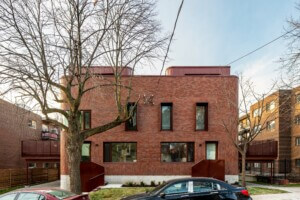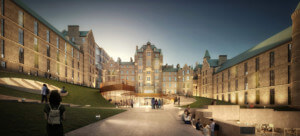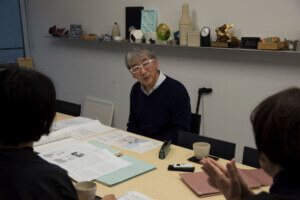Non-accessible spaces are a daily frustration for people who use wheelchairs.
Like many city-dwelling seniors, Chong-Wey Lin‘s grandmother was once an outgoing patron of her neighborhood’s restaurants but became hesitant to leave her house as her age climbed and her mobility decreased. Pained by his grandmother’s increasing isolation, Lin harnessed his background in information and data sciences to approach accessibility at a systems level. He created OurCityLove Social Enterprise, an organization that produces a suite of apps for people to rate restaurants on food and accessibility in select Asian cities.
Lin connected with disability rights activists in Taiwan to develop OurCityLove’s content and user experience. The app primarily serves wheelchair users, as well as people with vision and hearing impairments, and operates under the rallying cry of marginalized people across social movements: “Nothing without us about us.” A space may seem accessible to a person without disability, Lin explained, but reviews from users often describe a too-steep incline to the door, or cramped floorspace that makes getting to the tables impossible.
To generate content for the app, 400 paid ambassadors with disabilities go to restaurants, bars, hotels, and public spaces to take photos of entires, door handles, the width and height of tables, restroom accommodations, and parking facilities. The pictures often feature the ambassadors themselves: Users can see, for example, if their electric chair will be able to squeeze through a narrow entryway, or if a parking space would be able to accommodate a specially-designed vehicle. OurCityLove has rated 4,000 restaurants so far.
OurCityLove certifies accessible restaurants and has an in-app service that reads menus aloud for visually-impaired users.
Founded in 2012, OurCityLove now operates in 12 Taiwanese cities, as well as Japan, China, Hong Kong, Singapore, and Kuala Lumpur. Lin is looking to bring the app to North America and Europe in the next few years.
The information is helpful to restaurant owners and people without disabilities, especially as the number of mobility-impaired people in cities grows. “Oftentimes, restaurant workers don’t know how to serve people with disabilities. They offer too much help, or not enough.” OurCityLove helps to educate restauranteurs with initiatives like priority seating for customers with disabilities or temporarily limited mobility, similar to the near-the-door seats on public buses, Lin explained. “We invite restaurants to have priority seating. Of the approximately 3,000 accessible restaurants in Taiwan, about 2,100 now have priority seating.”
Lin pulled up OurCityLove on his phone. Users choose a category (restaurant, hotel, transportation) and whether they are looking, for example, to eat at a restaurant with wheelchair access and priority seating, or a restaurant near an accessible metro stop. (OurCityLove’s Friendly Metro Taipei even keeps tabs on elevator maintenance, so users aren’t inconvenienced by out-of-service lifts.)
“The issue of accessibility is not limited to disability. Everyone gets old, or has kids with strollers, goes on crutches. Everyone will once or occasionally have limited mobility.”
While dismantling barriers to physical accessibility through universal design is a crucial long-term goal, it takes time and money to modify the built environment, especially in older districts. OurCityLove bridges the gap as infrastructure catches up.










